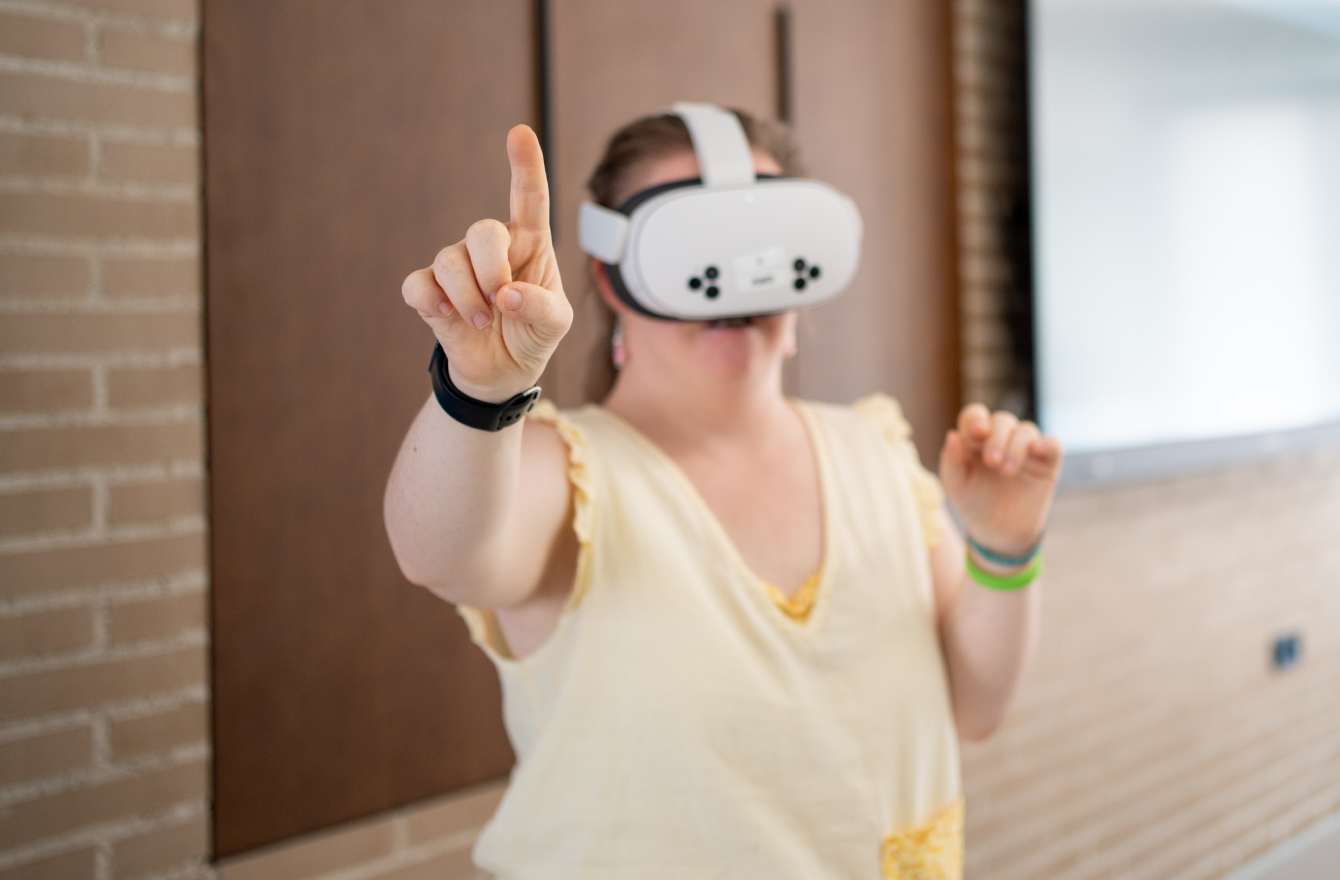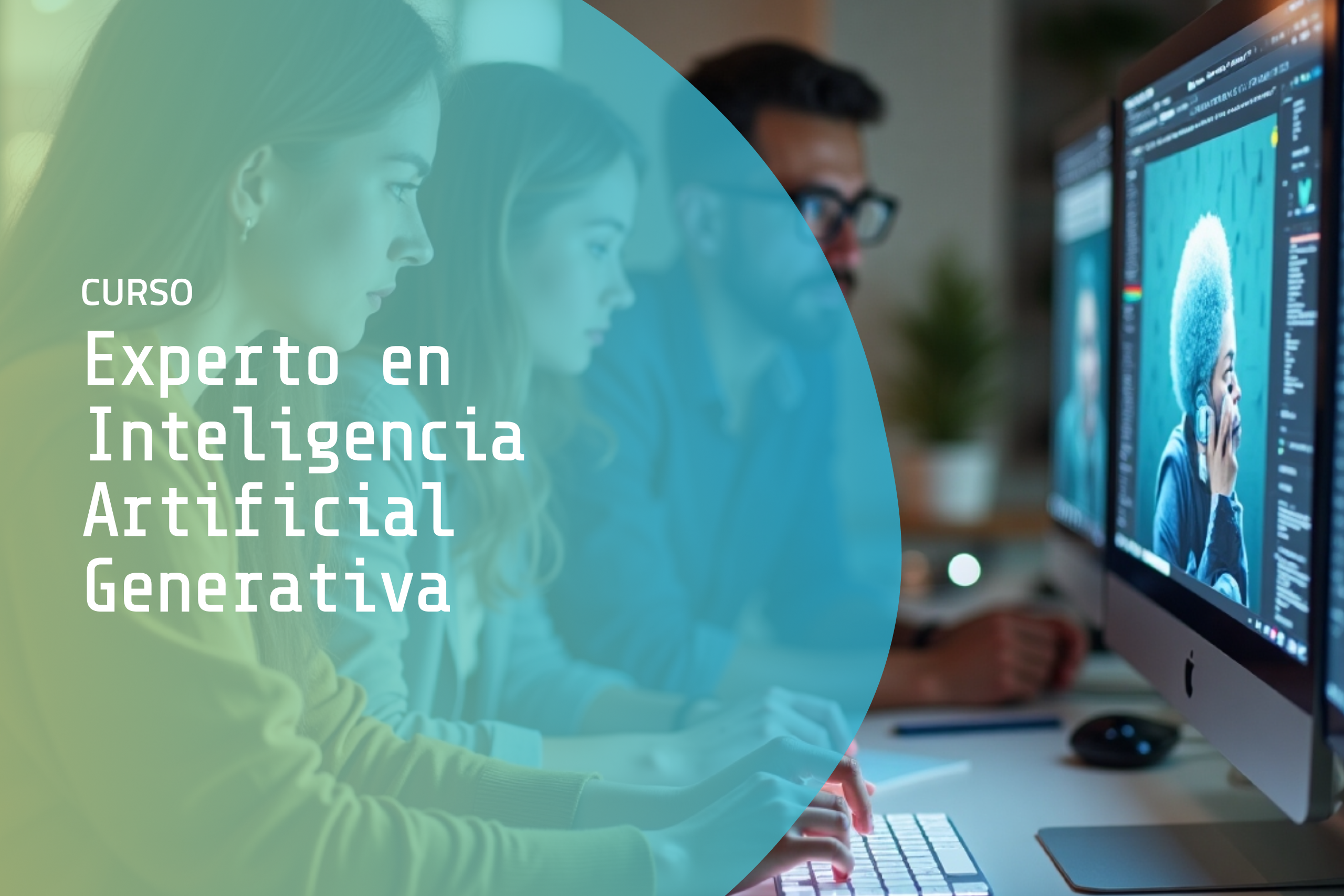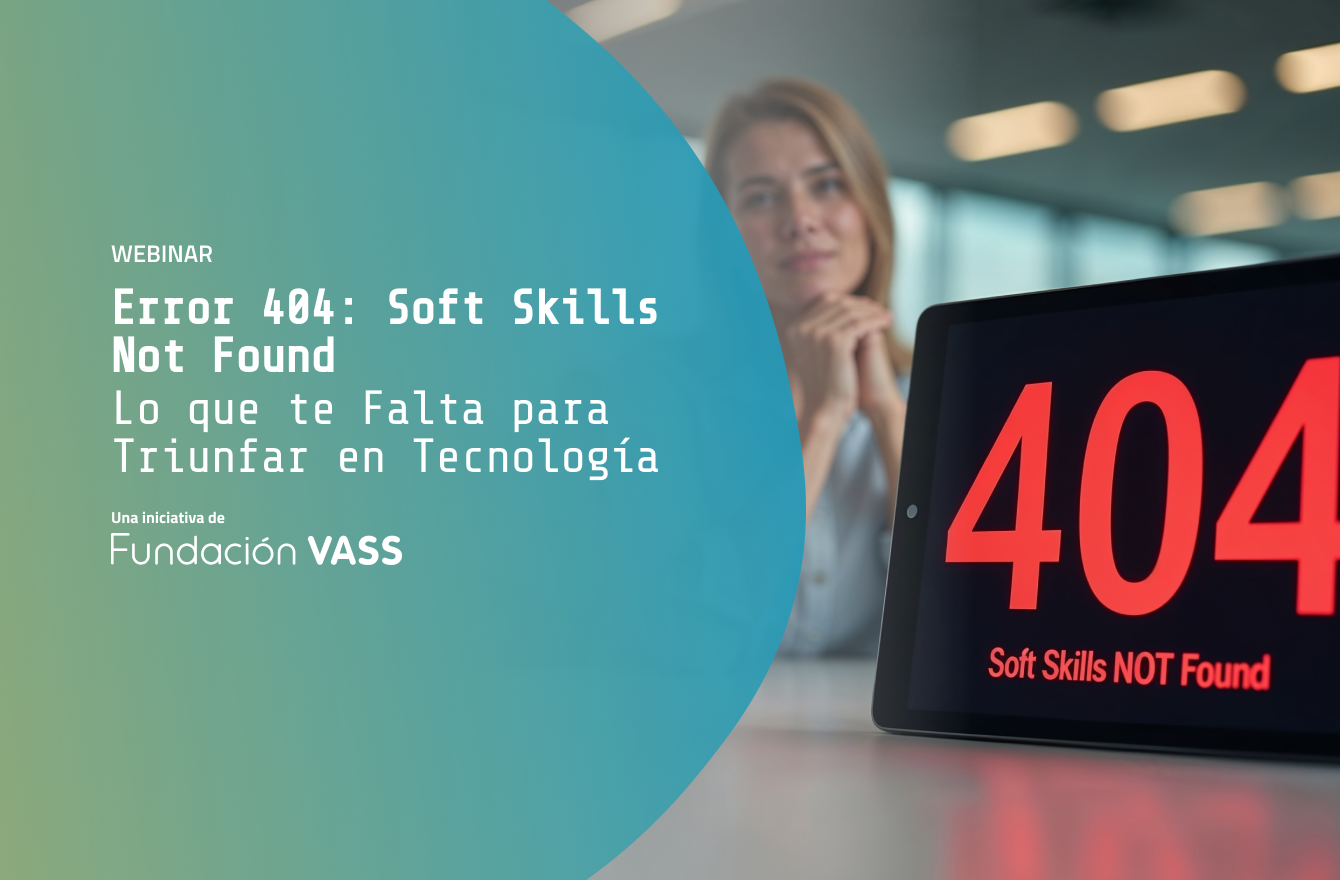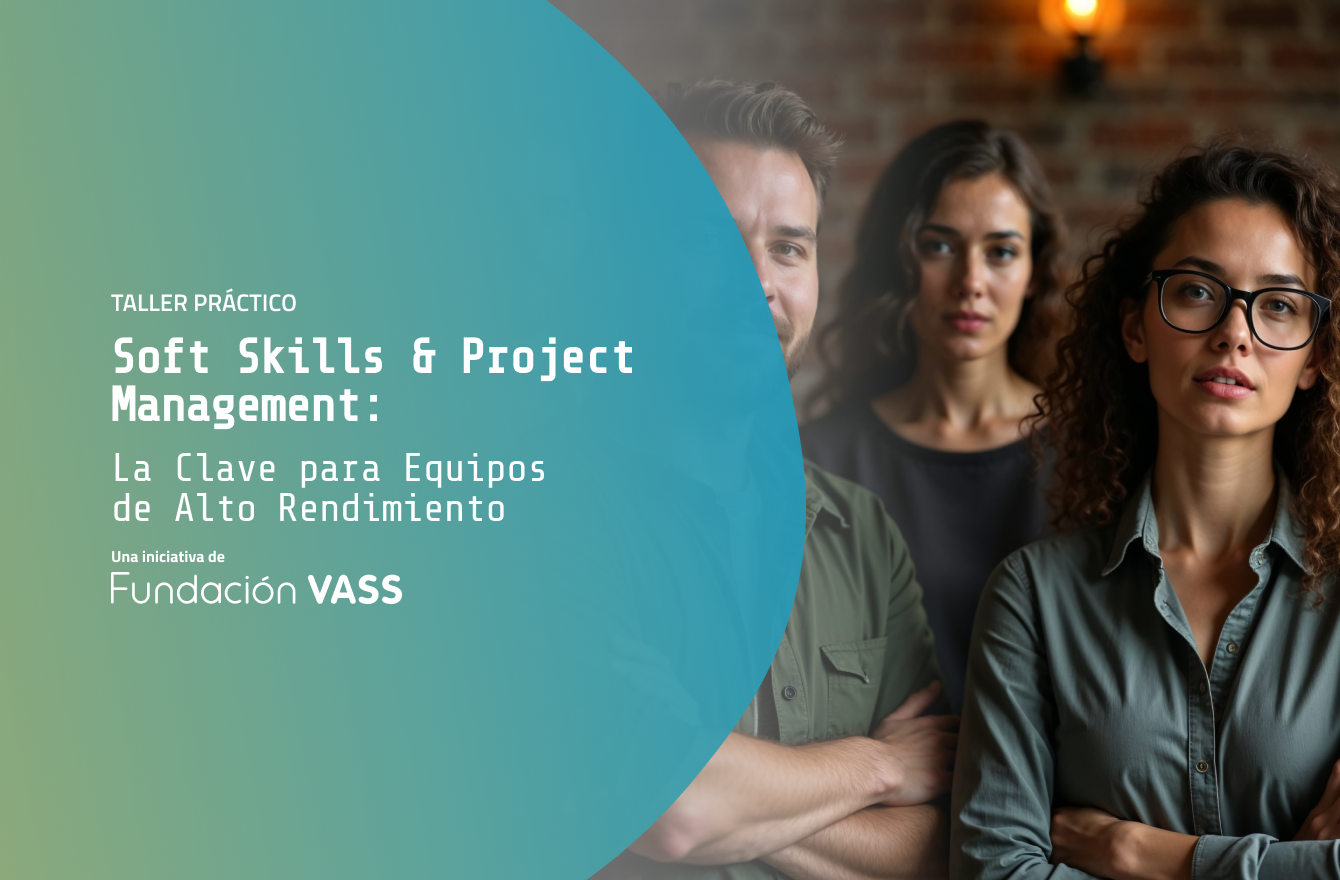VASS
University
Welcome to a new environment of applied knowledge, where the best professionals provide the knowledge and skills necessary to enrich and accelerate your professional career.
Be
vass
At VASS UNIVERSITY we generate and make technological and digital knowledge available to you, to accelerate and boost TALENT, your TALENT. We want to share our expert knowledge and first hand experience so that you can set a course for the future by learning from the best.
MORE TRAININGS
Web accessibility: Technology without barriers
Web accessibility: Technology without barriers
Webinar 'Successful Entrepreneurship' together with the Entrepreneurship Forum Spain, MIT Alumni
Webinar 'Successful Entrepreneurship' together with the Entrepreneurship Forum Spain, MIT Alumni
TALENT FLOW

Universities and companies: a shared challenge to boost the digital talent of the new generation
On 17 June, Antonio Rueda, director of VASS University and the VASS Foundation, moderated the webinar "Universities and companies: a shared challenge to boost the digital talent of the new generation".The event, in which representatives from academia, institutions and business reflected on how to strengthen collaboration in order to respond to the growing demand for digital profiles in Spain.
During the session, Carla Galbarriatu (Director General of Digital Services at the Ministry of Digital Transformation), Iván Manzanares (Director of CAITEC - Support Centre for Innovation and Knowledge Transfer - of the FUAM), Gustavo Romanillos (Professor at the Complutense University of Madrid and co-director of the Diploma in Sustainability and Digitalisation of the VASS Foundation), Gustavo Romanillos (Professor at the Complutense University of Madrid and co-director of the Diploma in Sustainability and Digitalisation at the VASS Foundation) and Federico Caro (Professor at VASS University and co-director of the Expert Diploma in Generative AI at the CEU San Pablo University) shared their perspectives and experiences around a key question: How to align training efforts with the real needs of a market in full technological transformation.
Digital talent, an urgent and shared challenge
From the outset, the speakers agreed on the seriousness of the existing gap between the skills offered by the university system and those required by companies to address their digital challenges. As highlighted by Carla GalbarriatuThis is not a new phenomenon, but the speed at which technologies, especially artificial intelligence, are evolving has made this disconnect deeper and harder to ignore.
In Spain, more than 32 % of companies admit to having difficulties in recruiting ICT specialists. This mismatch is especially critical in areas such as cybersecurity, where demand is twice as high as supply. Added to this is the growing international competition: remote work has turned talent recruitment into a global challenge.
The Ministry of Digital Transformation leads the National Digital Skills Plan, a strategic investment of more than 3 billion euros to strengthen digital training at all levels. Spain has made steady progress: it already exceeds the European average in basic digital skills and the number of ICT professionals is increasing every year. Even so, there is still an urgent need to train specialised talent. To this end, the government is committed to initiatives such as the Red.es scholarships and the reskillingwith an inclusive and cross-cutting approach.
The university, key to knowledge transfer
Iván Manzanares offered a different vision of the university, not as a distant or rigid institution, but as a dynamic actor that has been networking with the business and social fabric for years. Beyond formal education, universities do research, generate knowledge and transfer it through multiple channels. The Autonomous University of MadridThe EU, for example, has more than 3,000 researchers active in this work.
Although official degrees do not always manage to adapt to the pace of change in the market, universities are responding with agile solutions such as their own master's degrees, short courses, micro-credentials and tailor-made training for companies. This ability to adapt, coupled with the rigour of research, makes universities strategic allies. Manzanares also underlined the role of the teaching staff as a real source of talent: professionals with decades of experience who not only train, but also build relevant solutions for the productive sectors.
Comprehensive training: beyond technical skills
From their academic experience, Gustavo Romanillos He argued for the value of an education that combines conceptual soundness, critical thinking and technological mastery. In his speech, he argued that universities should go beyond mere practical learning and prepare students to understand the why of tools, not just the how. To illustrate this, he shared an anecdote and analogy: a drone can provide a precise image of the terrain, but drawing it by hand allows us to understand its spatial logic. That difference - between operating and understanding - is key in university education.
The Complutense University, like many others, is already reformulating its training offer with master's degrees in AI, big data or smart cities. In addition, it promotes early collaboration with companies through external internships and real projects such as the Article 60 agreements, which allow students to participate in work for public institutions or private companies. Initiatives such as the diploma in sustainability and digitalisation of the VASS Foundation also respond to new demands: quality training, with a practical approach and compatible with working life.
Companies that train, collaborate and learn
Federico Caro provided a perspective from the business environment, in which he highlighted a significant evolution: companies are no longer limited to looking for talent at the university, but are building a joint training model with it. The diploma in Generative AI promoted by VASS University and CEU San Pablo University is a clear example. Lecturers who are also working professionals deal with real cases with the students, which allows the training experience to be aligned with the specific challenges of the productive sectors.
Caro also pointed out other success stories, such as the agreement with the Carlos III University, focused on artificial intelligence, mobility and data analysis. This type of collaboration demonstrates that it is possible to bring together technical-academic knowledge with business domain knowledge to generate shared value. Quoting Satya Nadella, he recalled that in any sustainable relationship there must be a balance between what is given and what is received.
He also drew attention to two fundamental aspects: on the one hand, the need to improve the working conditions of research staff in universities, especially doctoral students; and on the other hand, the urgency of strengthening European investment in technology, science and infrastructure to ensure a competitive position on the international scene.
Conclusion: a collaborative ecosystem for transforming talent
The webinar made it clear that closing the digital talent gap is not the responsibility of a single actor, but a shared effort. Universities, companies and public institutions have to work together, with common objectives and sustainable cooperation mechanisms. It is not only about training the professionals of tomorrow, but doing so with an eye on the challenges of today.
Making the role of universities in the generation of knowledge more visible, facilitating the connection between students and companies, and guaranteeing continuous, accessible and quality training are fundamental steps towards progress. Citizens need to understand that science, education and innovation are not abstract concepts: they are already shaping our daily lives.
Ultimately, building a strong digital ecosystem requires real bridges between those who train, those who hire and those who shape the policies of the future. Only then can we ensure that talent - our most valuable resource - is developed, retained and translated into progress for all.

Immersive and inclusive virtual reality: VASS University promotes "Paso Adelante".
Murcia, 8 July 2025. At VASS University we understand education as a tool for social transformation. For this reason, together with VASS Foundation, Down Spain and the technology partner DEUSENSwe are involved in the development of Step Forwarda software application for the virtual reality designed to improve the labour inclusion of people with Down's syndrome and others intellectual disabilities.
Virtual reality as an ally of autonomy
Immersive technology opens up new possibilities for training. By means of virtual reality glasses, users can simulate public transport journeysThe programme is designed to help children learn to manage daily routines and cope with everyday situations in a safe and adapted environment. This type of practical and experiential training improves decision-making, strengthens personal autonomy and, above all, generates confidencea fundamental step towards the employability.
Real inclusion through educational technology
At VASS University we are committed to a learning model that is accessible and useful for everyone. Step Forward is a clear example of how the educational innovation can be at the service of people. The app has been developed in collaboration with professionals in social inclusion y adapted learningThis ensures an effective, respectful and transformative learning experience.
A project with purpose
This initiative is in line with our mission to promote a more sustainable inclusive training ecosystemThe aim is not only to boost digital talent, but also to promote values such as fairness, diversity and accessibility. Step Forward is not just a technological tool, but a proposal that unites education, innovation and social impact.

VASS Foundation and VASS Univesity launch the webinar "Universities and companies: a shared challenge to boost the digital talent of the new generation".
The digital transformation in Spain is advancing at great speed, and collaboration between universities and companies has become an essential pillar for training the talent that the market needs. With an increasing demand for professionals in areas such as artificial intelligence, software development, cybersecurity or sustainability.In this context, there is an urgent need to close the gap between academic training and the profiles most in demand.
In this webinar we will discuss how to accelerate that connection and how effective bridges are already being built between academia, business and government to foster the talent that is coming through.
We will be joined by expert voices who are already leading this transformation:
- Carla GalbarriatuDirector General of Digital Services in the Ministry of Digital Transformation
- Iván ManzanaresDirector of the CAITEC (Centre for Innovation Support and Knowledge Transfer) of the FUAM
- Gustavo RomanillosProfessor at the Complutense University of Madrid and co-director of the Diploma in Sustainability and Digitalisation
- Federico CaroProfessor at VASS University and Co-Director of the Expert Diploma in Generative AI at the CEU San Pablo University
Date: Tuesday, 17 June 2025
Timetable: 16:00h
Modality: Online
A conversation to understand what digital talent needs today and how we can shape it together.

Expert Course in Generative AI, a VASS University and CEU San Pablo University programme.
New Expert Course in Generative AI, a VASS University programme in collaboration with the University CEU San Pablo
The generative artificial intelligence is transforming the way organisations work, make decisions and relate to their users. That is why, VASS Universityin collaboration with the CEU San Pablo Universitylaunches the Expert Course in Generative AIa 4-month on-site training that offers an in-depth, practical and strategic insight into the actual use of the Large Language Models (LLM) in professional environments.
This programme is designed to train those who want to apply generative AI with purpose and tangible results, combining business acumen, ethical approach and current market tools.
What makes this course unique?
- Comprehensive training on LLM models and generative AI architectures.
- Study of key tools such as LangChain and how to integrate them into real solutions.
- Use cases in strategic sectors, with a practical and multidisciplinary approach.
- A innovation labwhere students will be able to define new use cases and measure their impact and feasibility through a methodological framework designed by the Generative AI Association (Gen@IA).
- A faculty made up of expert professionals from the sector, including colleagues from VASS | Intelygenzwith direct experience in the application of these technologies in real projects.
Who is it aimed at?
The course is aimed at technical and business profiles: professionals who lead innovation, digital transformation, strategy or technological development, and who want to apply generative AI effectively and responsibly in their day-to-day work. No previous advanced knowledge of AI is required.
Practical information
- Mode: On-site
- Delivered by: VASS University and CEU San Pablo University
- Start: October 2025
- Duration: 4 months
- Opening hours: Friday from 16:00 to 20:00h; Saturday from 10:00 to 14:00h CET
- ECTs: 15 ECTS
- Language: Spanish
More information and registration:
Lead the transformation with vision, method and real tools.
Generative artificial intelligence is here. This course is your chance to understand it, apply it and make a difference.

VASS University and VASS Foundation organise the webinar "Error 404: Soft Skills Not Found".
The labour market has changed dramatically in recent years, driven by digital transformation and process automation. In this new context, technical skills or "hard skills" are no longer enough to guarantee professional success. Companies are now actively looking for candidates with soft skillsThe interpersonal competences that enable better adaptation to change, effective communication and teamwork.
Soft skills, the engine of professional growth
Beyond technical knowledge, companies need professionals capable of leading teams, resolving conflicts and making a positive impact on the organisation. Skills such as empathy, resilience and emotional intelligence are increasingly valued as they enable teams to work more efficiently and face challenges with greater confidence.
Some of the skills most in demand in today's world of work include:
- Effective communicationKey to communicating ideas and collaborating with different teams.
- TeamworkFundamental in agile and dynamic environments.
- Adaptability and flexibilityEssential to cope with technological and organisational change.
- Critical thinking and problem solvingEssential for strategic decision making.
- Time management and leadershipProductivity and efficiency drivers.
A growing gap in soft skills development
Despite their importance, more and more studies are showing a gap in the development of these skills within organisations. Many companies are finding it difficult to develop the soft skills of their employees, which has repercussions for the talent management, innovation and digital transformation.
In a work environment where remote interactions and artificial intelligence are redefining work models, Well-developed soft skills are as important as technical knowledge.. However, the lack of training in these areas is still a pending issue in many companies.
The future of work requires a change of approach
To reduce this gap, it is essential that organisations incorporate strategies that encourage the development of soft skills in their teams. Commitment to continuous training, conscious leadership and emotional intelligence. will help build more collaborative, innovative and digitally-ready work environments.
Soft skills are no longer an extra, but a necessity. Those who manage to integrate them into their daily professional lives will be better prepared to face the challenges of the future and actively contribute to the growth of their companies.

VASS Foundation and VASS Univesity launch the workshop "Soft Skills & Project Management: The Key to High Performance Teams".
Did you know that only 22% of the projects achieve their objectives?
And that, globally, more than 1 million euros are lost every 23 seconds due to mismanagement?
The success of a project does not only depend on methodologies and tools, but also on the people who make it possible. The soft skills are the key to effective management, but how do you make sure that the Project Managers Do the people in your company have the necessary skills to optimise profitability and meet targets?
Exclusive practical workshop of VASS University and VASS Foundation
Aimed at training, HR, talent management and PMO managersThis hands-on 100% workshop will help you to identify and enhance the soft skills essential for project management. Through real cases and applied methodologies, you will discover how to optimise the allocation of roles and responsibilities to ensure efficient and cost-effective execution.
Date: Thursday, 3 April 2025
Timetable: 9:30 - 11:30h
Location: VASS, Alcobendas
Don't let poor talent management hold back the success of your projects. Get your team to turn every challenge into a success story. Get your team to turn every project into a success story.